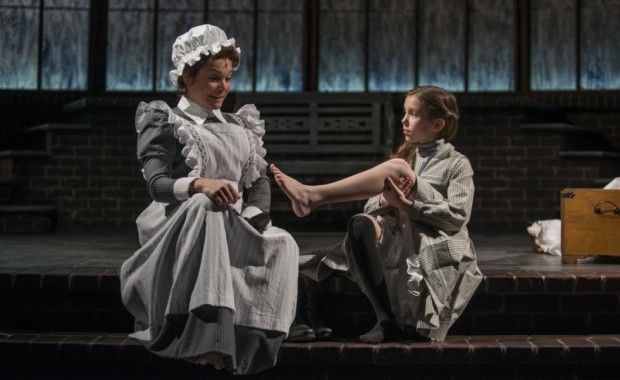The Secret Garden

(© Michael Brosilow)
There’s a magical quality to Frances Hodgson Burnett’s 1911 young adult classic The Secret Garden. The story of 10-year-old Mary Lennox, orphaned after her parents die of cholera and sent from her home in India to live in a bleak corner of England, is a tale of rebirth and redemption.
Hodgson’s lyrical language makes the book a natural for adaptation into a musical, and composer Lucy Simon and lyricist Marsha Norman succeeded in taking the page to the Broadway stage in their 1991 adaptation. In Court Theatre‘s staging of the musical, director Charles Newell crafts an intermittently capable production. Under the baton of music director Doug Peck, the piece sounds glorious. But it also lacks the burgeoning sense of wonder that is so crucial, and several directorial misfires keep The Secret Garden from fully blooming.
The story begins in 1906 India, as young Mary – the spoiled, sullen, child of wealthy English parents living in Colonial India – sleeps under a veil of mosquito netting while her father and mother waltz through a party swirling with colorful silk dresses and laughter. That vibrant, exuberant world is destroyed by the close of the first scene, everyone but Mary killed by cholera. The heat and clamor of India become a gauzy memory after she’s sent to live in England with her uncle, Archie, master of a cold gray mansion filled with grim secrets and surrounded by a vast, gray Yorkshire heath. The Secret Garden follows Mary as she shines a light on sorrows that Archie and his brother Neville have let fester in silence. The titular garden is both metaphorical and literal – Mary is an agent for growth, be it long-neglected plants or long-suppressed emotions.
A primary problem with Newell’s direction is its lack of subtlety. From the start, he doesn’t seem to trust the audience’s intelligence. When Mary’s mother Rose is first mentioned, a spotlight (or a spotlight-like lighting effect) shines on the character. When her father is mentioned, the light shifts to him. It may be intended to be helpful, but the impact feels too ham-fisted. In the final scene, which takes place in a fully blooming garden, everyone is outfitted in shades of green, an overly obvious visual that clobbers you with the scene’s intent.
The performances also lack nuance. As Mary, Tori Whaples (Whaples, who performed opening night, shares the role with Maya Hlava for the duration of the run) keeps a sour face throughout. As Mary’s journey winds on, there is no softening of her character, especially when she befriends the invalid Colin (Trent Noor opening night, Jake Helm at some performances). Joy is never really apparent.
Jennie Sophia as the ghost of Lily (Archie’s true love) is a constant presence, an otherworldly observer to Archie’s relentless mourning, Colin’s outspoken morbidity, and Mary’s tantrums. Sophia alternates between a furrowed brow and benevolent maternal smiling. Rob Lindley’s bereaved Archie is similarly overcooked. His voice makes the score soar, but his depiction of tortured melancholy is consistently overwrought. As the bitter brother Neville, Jeff Parker is the sole character who inhabits his role without exaggeration.
What does work beautifully is Peck’s supple five-piece orchestra. Peck has worked traditional Indian instruments (sitar and oud, played by Ronnie Malley) into the score, adding a shimmering thread of Indian flair through the soundscape. The sounds are perfectly embodied in Alka Nayyar’s intricate dance interludes. As Mary’s Indian ayah (or nanny), Nayyar is the graceful bridge between continents as well as the corporeal world and the spiritual world.
The gorgeous orchestrations help tremendously in "Hold On," the show’s 11-o’clock power ballad, sung by the maid Martha (Elizabeth Ledo). Though Ledo’s not a belter, she does project enough verve to serve the piece well, and backed by that marvelous chamber orchestra orchestrations, the number works.
Scenic designer John Culbert’s towering, slate-colored walls and arches are a fitting depiction of Archie’s gloomy mansion. But the emergence of the garden in the final scene, with a shipping container’s worth of petals abruptly blanketing the stage, has a crassly humorous effect that almost wholly obscures the point of the book’s final moments.
In the end, it’s Peck’s masterful delivery of the score that makes The Secret Garden worth seeing. Or at least, hearing.











